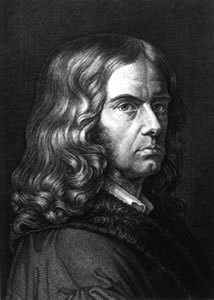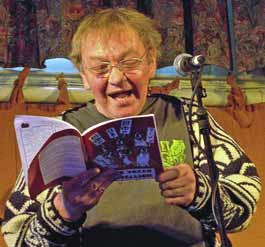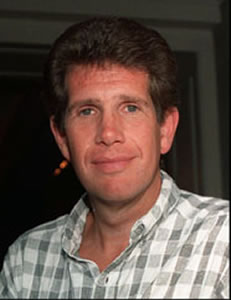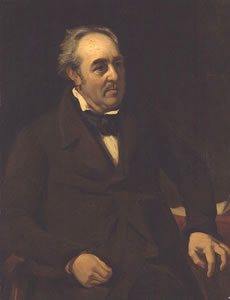De Nederlandse schrijver Tijs Goldschmidt werd geboren op 30 januari 1953 in Amsterdam. Zie ook mijn blog van 30 januari 2007 en ook mijn blog van 30 januari 2008 en ook mijn blog van 30 januari 2009.
Uit: Het feest als slagveld
“Uit het raam van mijn kamer heb ik zicht op het ouderlijk huis van Dick Hillenius (1927-1987). Het is het vierde huis voorbij de brug over de Amsterdamse Singel naar de Wijde Heisteeg aan de buitenzijde van de gracht. Binnen de grenzen van het gebied dat in zijn jeugd zijn territorium zal zijn geweest, bekeek ik zojuist op video Zintuigen zijn de voetjes van de ziel, de mooie film die zijn dochter Brigit Hillenius maakte over het verlies van haar vader en haar zoekend verdergaan daarna. Om te ontsnappen aan een al te geregeld bestaan, om te zien, te horen, te ruiken, te voelen en te proeven greep de sensuele Hillenius elke kans aan om te reizen naar, liefst mensloze, natuur. Zijn dochter reist in zijn voetsporen naar het regenwoud van Madagaskar waarover ze hem zo opgetogen had horen vertellen: het bos vol kameleons, kikkertjes en melancholiek roepende halfapen. Als ze aan de rand van het bos staat, merkt ze dat het haar weinig zegt. Zonder haar vader is het regenwoud ondoordringbaar. Ze beseft hoezeer ze hem mist. Ze besluit naar huis terug te keren en enkele familieleden en zielsverwanten te vragen naar hun band rnet Hillenius. Dat levert een rijk portret op. Vroman leest eigen gedichten en spreekt bevlogen over de kwetsbaarheid van Hillenius. Jaap Hillenius, de neo-illuministische schilder, vertelt over de totstandkoming van het meesterwerk waaraan hij jaren werkte. Maar het sterfschilderijtje dat hij naar aanleiding van de dood van zijn broer maakte, vindt hij misschien nog wel mooier. Op een zachtaardige manier maakt hij duidelijk dat het niet altijd even gemakkelijk was de jongere broer te zijn van de wat expansieve, soms zelfs overheersende Dick. Uit de woorden van zijn vrouw, Florrie Hillenius-Gehrels, die hij tijdens zijn biologiestudie leerde kennen, blijkt hoezeer ze hem mist, terwijl zijn dood haar in sommige opzichten ook wat meer lucht heeft gegeven.”

Tijs Goldschmidt (Amsterdam, 30 januari 1953)
De Vlaamse dichter, schrijver en journalist Bernard Dewulf werd op 30 januari 1960 in Brussel geboren. Hij debuteerde met de bundel Waar de egel gaat (1995) waarvoor hij in 1996 de Debuutprijs ontving. Zijn tweede bundel heette Blauwziek (2006). Daarnaast publiceerde hij twee boeken met essays over kunst: Bijlichtingen (2001) en Naderingen (2007). Ook vertaalde hij het klassieke toneelstuk Alcestis, in de bewerking van Ted Hughes.
Notitie
In alle vroegte doodstil opgestaan
om nog eens het eerste licht te zien.
Wassen, oude kleren aan. Koffie
en dan leven voor het open raam.
De meeuwen draaien om wat brood.
De kinderen slapen nog aan later jaren.
De duif zit dagelijks in de dakgoot.
De wolken kijken werkelijk te varen.
Terwijl ik het zit op te schrijven,
geen andere vraag zie dan het kijken,
komt er traag beweging in het huis.
Nooit wil het bij kijken blijven.
Spiegelkast
Vreemd, dat zij nu slapen moet. Er is nog
meer te doen. Net zou zij aan de strijk, het is
pas noen. En moeder zit nooit stil, meneer.
Iets in haar hoofd speelt met de tijd,
iemand die haar leven niet meer leidt.
Toch gaan gordijnen dicht. En groet zij kort
de glazen buurvouw, die zich ’s avonds
sluit. Morgen mag zij de kast weer uit.

Bernard Dewulf (Brussel, 30 januari 1960)
De Australische schrijfster Shirley Hazzard werd geboren op 30 januari 1931 in Sydney. Zie ook mijn blog van 30 januari 2007 en ook mijn blog van 30 januari 2008 en ook mijn blog van 30 januari 2009.
Uit: The Ancient Shore
„Of the millions who visit Italy each year, some thousands will return there “to live”—to spend a season or a year or two. Of these, a few will remain all their lives. If they are painters, writers, or musicians, they will carry on their trade in an ambiance that still esteems the individual effort of art. If they are scholars, they must take their chances in the gladiatorial arena of Italian erudition. Others may develop a career or, more usually, eke out a living with expatriate odd jobs. And there are some who can afford idleness in that peninsula where the cult of leisure flourishes still and where variety and pleasure can fill up many, though not all, days. No longer visitors, never to be natives, these people have arrived without the grim compulsions of migrants or refugees, and they move for the most part easily through the Italian dance, with excursions to their homeland. For a measure of affluence takes, these days, the edge off finality’s blade, and mobility suggests—delusively—that every journey is potentially a round trip.
Those of us who, when young, chose “to live” in the Italy of the postwar decades felt we were doing just that: living more completely among the scenes and sentiments of a humanism the New World could not provide. The Italian admixture of immediacy and continuity, of the long perspective and the intensely personal, was then reasserting itself after years of eclipse. It was a time not of affluence but of renewal, and Italy again offered to travelers her antique genius for human relations—a tact, an expansiveness never quite without form. One was drawn, too, by beauty that owed as much to centuried endurance as to the luminosity of art and which seemed, then, to create an equilibrium as lasting as nature’s. Like the historian Jakob Burckhardt, we felt all this was ours “by right of admiration.”

Shirley Hazzard (Sydney, 30 januari 1931)
De Duitse dichter en schrijver Adelbert von Chamisso werd op het slot Boncourt in de Champagne geboren op 30 januari 1781. Zie ook mijn blog van 30 januari 2007 en ook mijn blog van 30 januari 2008 en ook mijn blog van 30 januari 2009.
Nacht und Winter
Von des Nordes kaltem Wehen
Wird der Schnee dahergetrieben,
Der die dunkle Erde decket;
Dunkle Wolken zieh’n am Himmel,
Und es flimmern keine Sterne,
Nur der Schnee im Dunkel schimmert.
Herb’ und kalt der Wind sich reget,
Schaurig stöhnt er in die Stille;
Tief hat sich die Nacht gesenket.
Wie sie ruh’n auf dem Gefilde,
Ruh’n mir in der tiefsten Seele
Dunkle Nacht und herber Winter.
Herb’ und kalt der Wind sich reget,
Dunkle Wolken zieh’n am Himmel,
Tief hat sich die Nacht gesenket.
Nicht der Freude Kränze zieren
Mir das Haupt im jungen Lenze,
Und erheitern meine Stirne:
Denn am Morgen meines Lebens,
Liebend und begehrend Liebe,
Wandl’ ich einsam in der Fremde.
Wo das Sehnen meiner Liebe,
Wo das heiße muß, verschmähet,
Tief im Herzen sich verschließen.
Herb’ und kalt der Wind sich reget.
Dunkle Wolken zieh’n am Himmel,
Und es flimmern keine Sterne.
Wie sie ruh’n auf dem Gefilde,
Ruh’n mir in der tiefsten Seele
Dunkle Nacht und herber Winter.
Leise hallen aus der Ferne
Töne, die den Tag verkünden. –
Wird der Tag denn sich erhellen?
Freudebringend dem Gefilde
Wird er strahlen, Nacht entschweben,
Herber Winter auch entfliehen,
Und des Jahres Kreis sich wenden,
Und der junge Lenz in Liebe
Nahen der verjüngten Erde.
Mir nur, mir nur ew’ger Winter,
Ew’ge Nacht, und Schmerz und Thränen,
Kein Tag, keines Sternes Flimmer!

Adelbert von Chamisso (30 januari 1781 – 21 augustus 1838)
De Engelse dichter Les Barker werd op 30 januari 1947 geboren in Manchester. Hij volgde een opleiding tot accountant voordat zijn schrijverstalent werd ontdekt. Barker is vooral bekend om zijn komische teksten en nonsensgedichten. Hij trad eerst alleen op, maar later met de The Mrs Ackroyd Band. Gespeeld werd o.a. in Hongkong, Australië, Nieuw Zeeland, de VS en Canada. Er zijn meer dan 75 titels van Barker verschenen.
The Road To Tomorrow
Tune: Boithrin bui (the yellow road)
The road to tomorrow’s a hard road to take;
It may lead us through sorrow for foolishness’ sake;
And it twists and it turns, at first left and then right,
And there’s many are lost in the darkness of night.
They stray from the path on the way through the trees,
For they think they may wander wherever they please,
But the road to temptation’s down there in the wood
And it won’t always lead you the way that it should.
The road out of evening that leads to the dawn
Can bless you with burdens that need to be borne;
For at sunset, the emptiest head may depart
And arrive the next morning the heaviest heart.
For which road’s the right one? The wise cannot say,
Though both foolish and wise walk the distance each day;
For there’s signposts to read, sage advice you may take
And there’s fools you may heed and wrong turnings to make.
The road to tomorrow is one I know well
For I’ve walked it to heaven and walked it to hell;
I’ve walked it both happy and sad as can be
And I wonder if you’d care to walk it with me;
The road through the night to the morning is wide
So two may walk down it to dawn, side by side;
So come with me now down that road, hand in hand;
Let’s be lovers forever in morning’s bright land;
We’ll be lovers forever in morning’s bright land.

Les Barker (Manchester, 30 januari 1947)
De Amerikaanse schrijver Michael Anthony Dorris werd geboren op 30 januari 1945 in Louisville, Kentucky. Hij behaalde een BA aan de Georgetown University in 1967 en een M.Phil. van Yale University in 1970. In 1971 werd hij de eerste ongetrouwde Amerikaan die een kind adopteerde. De drie jaar oude Lakota jongen Reynold Abel leed aan een alcohol syndroom, omdat zijn moeder tijdens de zwangerschap had gedronken. Morris schreef er zijn beroemdste boeken over The Broken Cord (1989). Voor het boek kreeg hij de National Book Critics Circle Award for General Nonfiction. In 1987 verscheen zijn roman A Yellow Raft in Blue Water (1987). In 1991 werd Reynold Abel gedood bij een autoongeluk. Dorris pleegde in 1997 zelfmoord.
Uit: Cloud Chamber
„When I was still Rose Mannion and had the full use of myself, I was a force to behold. My hair’s fine blackness was my signature, the legacy of a shipwrecked Spaniard off the Armada who washed onto Connemara and arrived, bedraggled and desperate, at the cottage door of some love-starved great-grandmother. In every generation that followed, it is said, there is but one like me. My mother used to call my mane a rain of Moorish silk as she brushed two hundred strokes before prayers. Never cut since birth, each wisp that pulled free she collected and worked into a dark snake she scored inside a wooden box. Now, ever since that terrible night, its lengthening coil I wind within a salver of Galway crystal, my constant souvenir of destruction. In the milky glow of lamplight it shifts and expands through the engraved cuts like a Hydra with many faces, each one of them Gerry Lynch.
What was there, back then, not to love about Gerry Lynch? It’s true, I was a girl in the habit of measuring each person new to me by a tabulation of their natural imperfections: this one had too short an upper lip, that one unfortunate hair. This one was marred by the heaviness of the upper arm, that one by the gap of a missing tooth — the easier to place them the next time we met. But Gerry Lynch broke the mold.
You even had to adore his flaws. Too quick with the compliments, and those, too expansive to be absorbed without a shading of doubt. A tendency to sometimes withdraw into the depths of himself while feigning to listen politely. A furtiveness, hesitancy, better describes it, and at the late-night meetings, when his turn to speak arrived, he once or twice in his enthusiasm seemed just that much off — brasher than need be, almost as if he took personally the injury that united us all in our resolve to remedy. An occasional bout of silliness, a touch boyish in a grown man.
But if these trifles be the beads on his Sorrowful Mysteries, think only of the Joyful, the Glorious! His devotion to the Cause. His bow-head humility at the Communion rail. His gait, so bouncing with natural exuberancy that who could fail to follow where he led? His clean town-smell, warm days and chill. The tenor voice that pulled the heart tight as the cross-stitch of a doubled thread. And for the Hail Holy Queen: that song he made up, that darling brave ballad that bore my name. He sang it to all who’d listen, his eyes twinkling merry except when he’d glance into the crowd my way, and then, so serious that everyone but us two faded into nothing. I could not meet his eyes, and still draw breath.“

Michael Dorris (30 januari 1945 – 10 april 1997)
De Engels-Amerikaanse schrijfster Barbara Wood werd geboren op 30 januari 1947 in Warrington. Zie ook mijn blog van 30 januari 2008 en ook mijn blog van 30 januari 2009.
Uit: Daughter of the Sun
„The runner sprinted down the paved road, his heart pounding with fear. Although his feet were bleeding, he dared not stop. He looked back. His eyes widened in terror. He stumbled, fought for balance, and pushed on. He had to warn the clan.
A Dark Lord was coming.
Ahoté could not help his forbidden thoughts. There sat beautiful Hoshi’tiwa, just a hundred paces from where he stood at the Memory Wall, radiant in the sunshine as she spun cotton ribbons for her bridal costume. She looked so happy in front of her small adobe house, shaded by cottonwood trees, with the fresh stream trickling nearby. All she had been able to talk about was the coming wedding day. But all Ahoté could think about was the wedding night.
His father pinched him.
Under the elder’s tutelage, eighteen-year-old Ahoté was reciting the clan history, using the pictographs painted on the wall as a guide. Each symbol represented a major event in the past. And as there were too many events recorded on the Memory Wall – symbolized by spirals, animals, people, lightning strikes – for the clan to remember, it was the job of one man, He Who Links People.
This was the sacred calling to which young Ahoté was apprenticed and upon which he must concentrate. But his mind was wandering.
His father scowled. Takei did not understand the boy’s lovesick state. When Takei had wed, years ago, a girl chosen by his parents, he had done his duty, begetting her with many children. He had never wasted his time in moony-eyed daydreaming and sexual fantasies. Sex was for creating children, not for idle amusement. If Takei had ever taken pleasure in the intimate act, he could not recall it.“

Barbara Wood (Warrington, 30 januari 1947)
Voor nog meer schrijvers van de 30e januari zie ook mijn vorige blog van vandaag.





